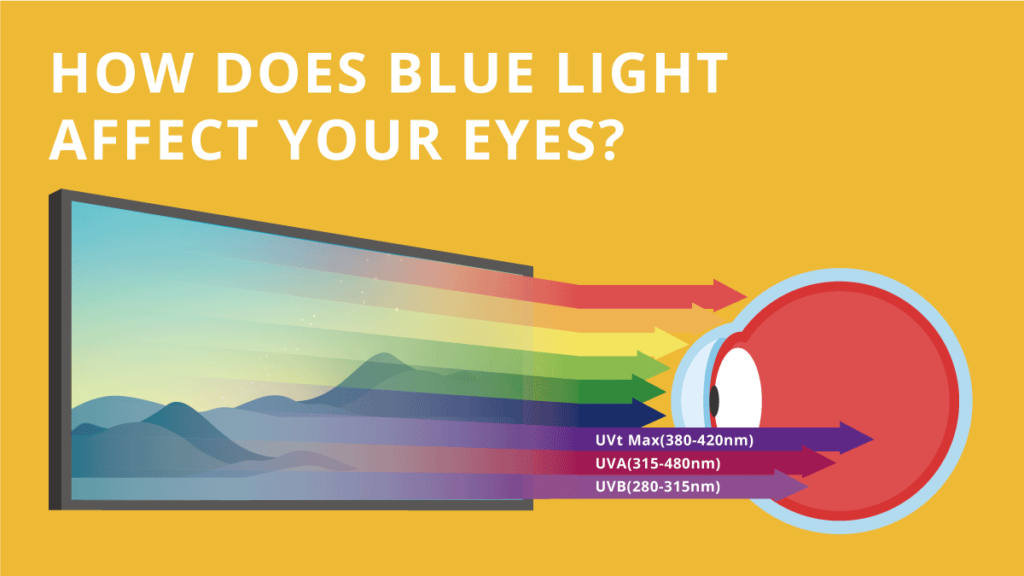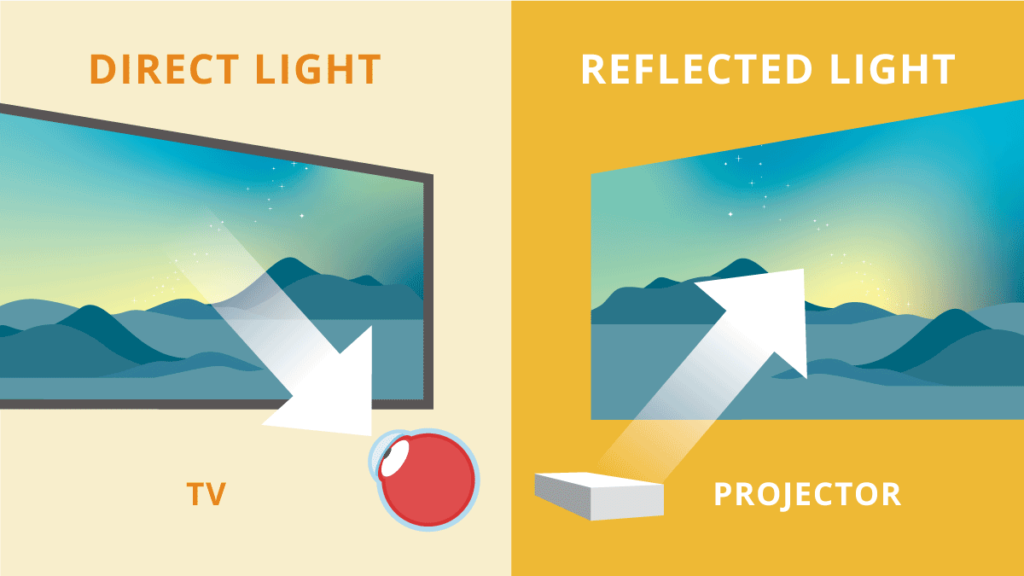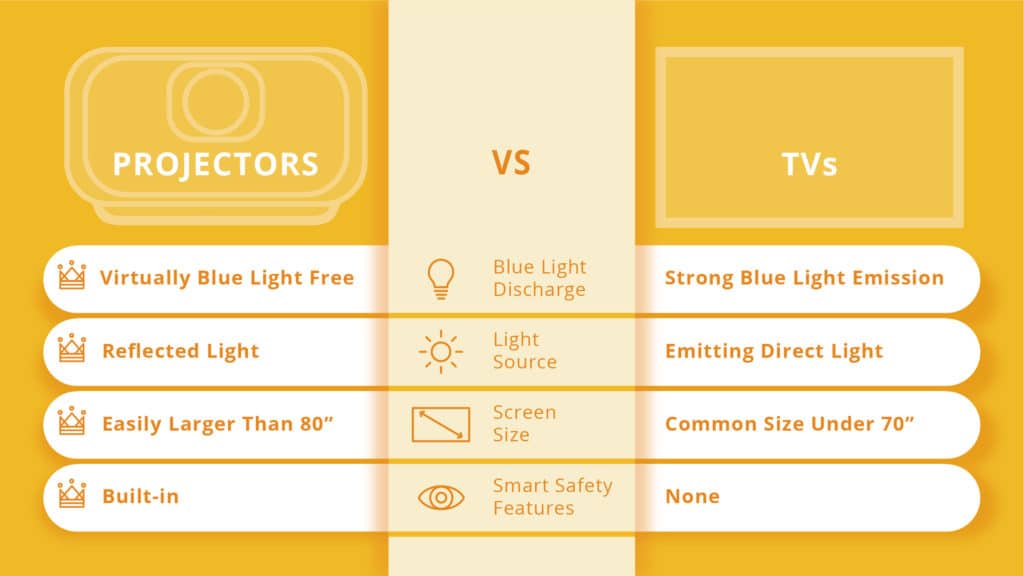When it comes to protecting your eyes, the choice between a projector and a TV is more important than you might think. TVs emit direct blue light, which can strain and harm your eyes over time. On the other hand, projectors use indirect light that’s far gentler, even when it comes to blue light.
Curious about how this impacts your eye health? Read on to find out which display option is best for your eyes, or explore some home theater projectors designed with eye-care in mind.
Projectors vs. TVs, which should you choose for your next home entertainment setup? There are many crucial factors to consider such as cost, screen size, resolution, and image quality, but those are features of the product itself. What about consideration to effects of the product on the user, in this case, you and your family, who will be spending hours enjoying TV programs, movies and streaming content on your new home entertainment system? When selecting a solution that will have the least effect on your health, especially your eyes, there are some issues you may not have considered before.
Avoid Blue Light Eye Damage
Blue light should be the first concern for people addicted to screen time. We spend hours at work, school, and home with our eyes glued to screens, and the largest screens we have are our TVs. LCD, LED, and all the other TV varieties emit blue light, which especially at night has detrimental effects on our health.

Blue light is a cause of digital eye strain, a medical issue with serious symptoms including blurry vision, difficulty focusing, dry and irritated eyes, headaches, and neck and back pain. Additionally, long-term effects show that high levels of long-term blue light exposure may cause permanent eye damage and contribute to the destruction of the retina and macular degeneration.
How Does Blue Light Damage Your Eyes?
Blue light is a wavelength of light found in natural sunlight and artificially from things that emit light such as lightbulbs, computer screens, and TVs. Although most of the wavelengths in blue light are safe for your eyes, high-energy blue-violet light in the 415-455nm band is more damaging to the eyes, especially the lens and retina. This range of blue light falls under UV intensity, which is widely known to be harmful to the human body if overexposed (one of the reasons we get sunburns). Sadly, wearing UV blocking sunglasses would not be ideal when trying to watch your favorite movie or show.
What Can We Do to Cut Back on Blue Light Exposure?
One way to cut back on blue light exposure is to cut back on your screen addiction. Cutting back is very unlikely or impossible for most people, especially if people have to work with a computer, then spend the rest of the day checking their smartphones and watching a favorite TV show when they get home.
An alternative to blue light-emitting TVs is using projectors. While projectors do produce blue light, the viewing experience is different because you are not looking directly at the light source. Instead, the light from the projector bounces off a surface, such as a screen or wall, before reaching your eyes. This surface absorbs some of the harmful wavelengths, thereby reducing the amount of blue light that hits your eyes directly.
Projectors also have some other advantages over TVs such as indirect lighting, adjustable screen size, and built-in safety features.

The Effects of Direct or Indirect Light Sources to Eye Health
Light sources can be divided into two kinds based on the path taken to your eyes: direct and indirect light. Most of the light sources we encounter daily from the fluorescent lamps above your heads to the TV screens in your living rooms are direct light emitters. This means these items produce light and it travels directly to your eyes.
Direct light sources are harsher on your eyes in comparison to indirect light. To illustrate, staring at a flashlight beam directly is a lot more uncomfortable than staring at that light bouncing off a wall. Projectors utilize reflected light, which is less invasive to your sight and reduces eyestrain and other negative effects of prolonged viewing.
Screen Size – Bigger Is Better
Projectors’ screen size can readily create images larger than what is possible for TVs; a screen of over 100 inches or even 200 inches can be produced easily. For those looking for eye comfort, projectors’ large screens are even better. Larger screens create images that are bigger and more comfortable for the eyes to view.
Cutting down the need to strain your eyes to see details. For text, like subtitles, it is even more beneficial. Larger letters make things a lot easier to read. Altogether, projectors offer larger screens, reduce blue light, bypass direct light, and utilize reflective light, which equals a much more comfortable viewing experience compared to TVs.
Low Blue Light Projector to Protect Your Eyes
Lastly, some modern projectors nowadays come with the added benefit of having built-in eye care features to help prevent eye fatigue. Smart projectors like the ViewSonic X1-4K have an Eye Protection feature certified by TÜV SÜD for a low blue light ratio which contributes to increasing eye protection, allowing you to enjoy prolonged viewing periods with minimized eyestrain.
This is great for peace of mind if there are kids and elderly in the family. Everyone can now enjoy bright and enjoyable home entertainment without worrying about ever having problems from direct projector-beam exposure. Interested in buying a smart projector? Read more about the benefits of buying a smart projector for your home theater.

Final Thoughts
Compared to TVs, projectors offer much more flexibility while being much safer for viewers’ eye health. Projectors reduce the effects of blue light and direct light while also offering adjustable screen projection size, and newer projectors have smart safety features to avoid accidental eye injury.
If you are considering a new TV or projector, consider the effects they have on your eyes. Take a break from the many screens in your life and try a projector. Ready to get your own projector? Explore a wide range of ViewSonic projectors. Still need help on how to choose a projector? Check out our home and sports projector buying guide or commercial projector buying guide.